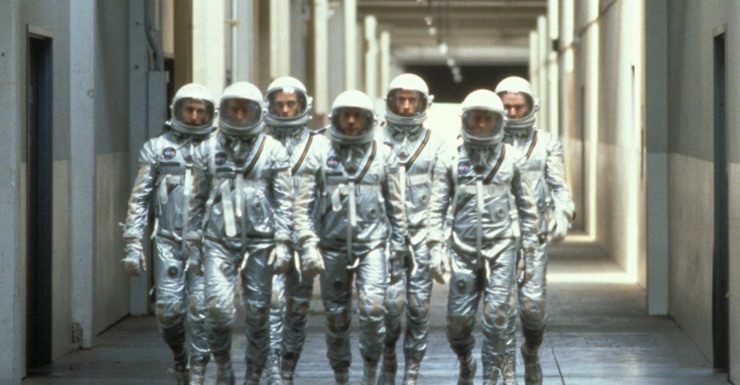Space travel has always been an operatic exercise. Igniting millions of pounds of explosive fuel inside a machine carrying a crew of human beings and flinging rocket and living payload into the void at thousands of miles per hour is not the stuff of chamber music. It’s a big, crashing, multi-part symphony of noise and light and life and drama. Some books, however, capture that power more than others. It was the narrative pyrotechnics of space that drew me to write Apollo 13 with astronaut Jim Lovell and, now, to return to that great trove of space tales with Apollo 8. I can, of course, hardly be objective about the five books that best turn space history into dramas. So leaving it to others to judge my own, here are the five that have thrilled me most.
A Man on the Moon by Andrew Chaikin
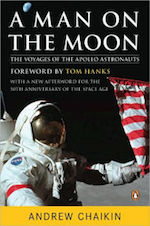 The great sweep of all of the Apollo lunar missions is included in Chaikin’s landmark book. It’s not just Apollos 8, 11 and 13; it’s Apollo 15—one of history’s greatest scientific field expeditions; it’s Apollo 12, with its improbably precise landing within walking distance of the Surveyor 3 spacecraft, which had landed on the moon two and a half years earlier; it’s Apollo 17, the capstone—and the poignant end—of the Apollo lunar program. Chaikin’s book served as the basis of the HBO series From the Earth to the Moon, but even without that spectacular TV treatment, it would be a triumph of powerful history masterfully told.
The great sweep of all of the Apollo lunar missions is included in Chaikin’s landmark book. It’s not just Apollos 8, 11 and 13; it’s Apollo 15—one of history’s greatest scientific field expeditions; it’s Apollo 12, with its improbably precise landing within walking distance of the Surveyor 3 spacecraft, which had landed on the moon two and a half years earlier; it’s Apollo 17, the capstone—and the poignant end—of the Apollo lunar program. Chaikin’s book served as the basis of the HBO series From the Earth to the Moon, but even without that spectacular TV treatment, it would be a triumph of powerful history masterfully told.
The Right Stuff by Tom Wolfe
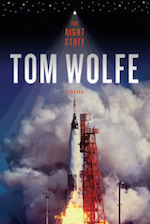 Surprised? Of course you’re not. The Right Stuff is to space books what High Noon is to westerns—an entry that makes everyone’s best-of list. The opera here, is found most loudly—and eccentrically—in Wolfe’s strange and singular prose. That prose was not always to the liking of the astronauts themselves, who sat for the interviews and told their stories and then read the way Wolfe had written them up. But that was OK, because the readers for whom the book was intended could not get enough of Wolfe’s comic-beatnik weirdness. Nonfiction space writing had always been equal parts engineering and heroism, but zero parts whimsy. Wolfe changed that—and for the better.
Surprised? Of course you’re not. The Right Stuff is to space books what High Noon is to westerns—an entry that makes everyone’s best-of list. The opera here, is found most loudly—and eccentrically—in Wolfe’s strange and singular prose. That prose was not always to the liking of the astronauts themselves, who sat for the interviews and told their stories and then read the way Wolfe had written them up. But that was OK, because the readers for whom the book was intended could not get enough of Wolfe’s comic-beatnik weirdness. Nonfiction space writing had always been equal parts engineering and heroism, but zero parts whimsy. Wolfe changed that—and for the better.
The Martian by Andy Weir
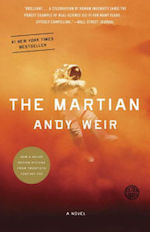 True, this isn’t based in history, but it reads like it could be. There are, so the thinking goes, only a few basic plots: comedy, tragedy, rebirth, romance, voyage and return, warfare, rags to riches. But there are sub-categories too, and in the “voyage and return” column, include the tale of the castaway. The storyline is so appealing because the survival tale is magnified by the lone person’s awful solitude. It was inevitable that eventually the person who was cast away would be cast away in space—the idea was tried in the broadly awful 1964 film, Robinson Crusoe on Mars, which relied on scale and flash to achieve its execrable results. Weir’s book is the utter opposite—precise, detailed, almost pointillistic. And yet from that fine, dot-at-a-time writing comes a roaring, churning story. Weir’s writing is the literary equivalent of nuclear fuel: compact, seemingly spare, and improbably powerful.
True, this isn’t based in history, but it reads like it could be. There are, so the thinking goes, only a few basic plots: comedy, tragedy, rebirth, romance, voyage and return, warfare, rags to riches. But there are sub-categories too, and in the “voyage and return” column, include the tale of the castaway. The storyline is so appealing because the survival tale is magnified by the lone person’s awful solitude. It was inevitable that eventually the person who was cast away would be cast away in space—the idea was tried in the broadly awful 1964 film, Robinson Crusoe on Mars, which relied on scale and flash to achieve its execrable results. Weir’s book is the utter opposite—precise, detailed, almost pointillistic. And yet from that fine, dot-at-a-time writing comes a roaring, churning story. Weir’s writing is the literary equivalent of nuclear fuel: compact, seemingly spare, and improbably powerful.
Carrying the Fire by Michael Collins
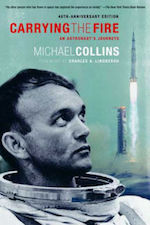 Astronaut autobiographies are not supposed to be transcendent reading. They’re supposed to be first person tales, told with the lean language of the engineer and sold on the strength of the byline more than the tale. That’s why Collins’ book, released in 1974, is such a paradigm changer. Command module pilot of Apollo 11—the first lunar landing—and copilot of the lesser known Gemini 10 three years earlier, Collins ultimately became the poet laureate of the astronaut corps. You don’t need lyricism to make the story of the first lunar landing compelling, but Collins gives it to you anyway, as in his description of seeing the Earth rise above the lunar surface:
Astronaut autobiographies are not supposed to be transcendent reading. They’re supposed to be first person tales, told with the lean language of the engineer and sold on the strength of the byline more than the tale. That’s why Collins’ book, released in 1974, is such a paradigm changer. Command module pilot of Apollo 11—the first lunar landing—and copilot of the lesser known Gemini 10 three years earlier, Collins ultimately became the poet laureate of the astronaut corps. You don’t need lyricism to make the story of the first lunar landing compelling, but Collins gives it to you anyway, as in his description of seeing the Earth rise above the lunar surface:
“It pokes its little blue bonnet up over the craggy rim and then, not having been shot at, surges up over the horizon with a rush of unexpected color and motion. It is a welcome sight for several reasons: it is intrinsically beautiful, it contrasts sharply with the smallpox below, and it is home and voice for us.”
There is also the stark awfulness of the moment he learned that astronauts Gus Grissom, Ed White and Roger Chaffee had burned to death on the launchpad in their Apollo 1 spacecraft, which at that time was known by the inventory number 012. The information came to him via a phone call to a test assistant named Don Gregory:
“After what seemed like a long time, Don finally hung up and said very quietly, ‘Fire in the spacecraft.’ That’s all he had to say. There was no doubt about which spacecraft (012) or who was in it (Grissom-White-Chaffee) or where (Pad 34, Cape Kennedy) or why (a final systems test) or what (death, the quicker, the better).”
There is music in that writing—sometimes pizzicato, sometimes declamando. Not every author can play it. Collins—engineer and pilot by training—can.
Dragonfly by Bryan Burrough
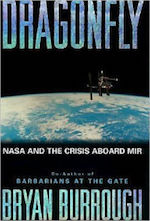 Long after the near disaster of Apollo 13, there was another high-wire moment in space. This time it was in Earth orbit. But death is death whatever your cosmic altitude, and in 1997, the Russian-American crew aboard the aging Mir space station nearly met their end when an unmanned Progress ship collided with the station. The hull was breached, the power was lost and the crew went slowly tumbling through their orbits, their solar panels helpless to aim themselves toward the power source of the sun. The crew’s survival was every bit the uncertain thing the Apollo 13 astronauts’ was. The Dragonfly tale may be less well-known than that of the earlier moon mission, but it’s every bit as harrowing—and every bit as worthy of being told.
Long after the near disaster of Apollo 13, there was another high-wire moment in space. This time it was in Earth orbit. But death is death whatever your cosmic altitude, and in 1997, the Russian-American crew aboard the aging Mir space station nearly met their end when an unmanned Progress ship collided with the station. The hull was breached, the power was lost and the crew went slowly tumbling through their orbits, their solar panels helpless to aim themselves toward the power source of the sun. The crew’s survival was every bit the uncertain thing the Apollo 13 astronauts’ was. The Dragonfly tale may be less well-known than that of the earlier moon mission, but it’s every bit as harrowing—and every bit as worthy of being told.
Top image: The Right Stuff (1983)
 Jeffrey Kluger is the author of several books, including Apollo 13 (originally published as Lost Moon) and The Sibling Effect. His latest is Apollo 8, the story of the first mission to the moon. As a science editor and senior writer for Time for more than two decades, he has written more than forty cover stories for the magazine. He lives in New York City.
Jeffrey Kluger is the author of several books, including Apollo 13 (originally published as Lost Moon) and The Sibling Effect. His latest is Apollo 8, the story of the first mission to the moon. As a science editor and senior writer for Time for more than two decades, he has written more than forty cover stories for the magazine. He lives in New York City.










